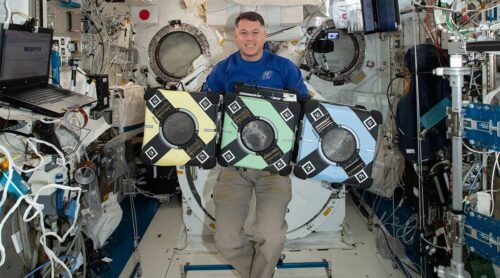NASA’s AstroBee robots have started working independently for the first time with humans side by side.
Humans are accompanied by the robots at the International Space Station. They have been accompanied by cube-shaped free-flying robots, AstroBees, for a while now. And now these robots are capable of working independently beside humans.

In a latest video shared by NASA, two AstroBees named Queen (foreground) and Bumble (background) can be seen working independently alongside astronauts Raja Chari (nearest to the camera) and Matthias Maurer (farthest from the camera).
For the first time, the Astrobee robo-assistants aboard the @Space_station are working independently beside their human counterparts! The robots are an important component to @NASA’s mission, helping manage routine tasks and free up time for the crew. https://t.co/lQFce0QSH9 pic.twitter.com/POHFO4QXhK
— ISS Research (@ISS_Research) July 22, 2022
The AstroBee system consists of three cube-shaped robots, software and a docking station for recharge. These robots use electric fans to propel around the microgravity environment of the space station. The robots use cameras to navigate across the station and use a mechanical arm to hold on to railings and instruments.
The AstroBees are based on the SPHERES (Synchronized Position Hold, Engage, Reorient, Experimental Satellite) technology which are being used on the space station since decades and are to be replaced once Astrobee gets commissioned.
Bumble was the first of the AstroBee to fly with its own power. The Astrobee team at NASA’s Ames Research Center in Silicon Valley verified that Bumble could find its position and was ready to navigate within the space station. This was measured as a part of the Integrated System for Autonomous and Adaptive Caretaking(ISAAC) project. Scientists have been teaching AstroBees how to autonomously support spacecraft monitoring and maintenance. They are trained to manage basic chores to help astronauts and allow them to focus on more complex and important tasks.
Bees are considered as one of the highly contributing species of nature and similarly these AstroBees can hold the title for the development of new capabilities in space exploration.






